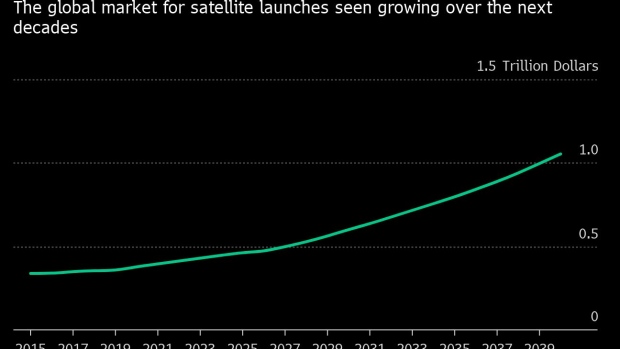Mar 31, 2021
Rocket Startups Craft Bespoke Launchers to Join New Space Race
, Bloomberg News

(Bloomberg) -- In the new space race, bigger isn’t always better.
That’s the view of rocket startups Isar Aerospace Technologies GmbH, Rocket Factory Augsburg AG and HyImpulse Technologies GmbH. The three firms, all based in southern Germany, are betting clients will pay a premium to use their so-called micro-launchers, gaining flexibility in transporting the tiny satellites set to revolutionize global communications.
Each is developing rockets capable of carrying between 500 and 1,500 kilos (3,300 pounds) into low Earth orbit. While that’s a fraction of the tens of thousands of kilos hauled by the Falcon 9, operated by Elon Musk’s Space Exploration Technologies Corp., it’s enough to transport the satellites now being deployed for everything from super-fast Internet to autonomous driving.
The trade-off is cost. SpaceX has been able to win market share -- including a possible deal with with carmaker Volkswagen AG -- by designing reusable rockets that bring down the price of each mission. But the three startups reckon surging demand for launches coupled with an initial lack of capacity will allow boutique services to thrive alongside established players.
“It’s like the difference between taking a bus or a taxi,” says Christian Schmierer, founder of HyImpulse, which plans to charge 7,000 euros ($8,217) per kilo of payload, more than 2 1/2 times SpaceX’s $2,700. “A bus is cheaper, but a taxi is more convenient and will get you to your destination quicker.”
Broadband satellites are set to drive at least half the growth that will see space-industry revenue almost triple to $1 trillion by 2040, according to Morgan Stanley. The launcher market should double in size to $26 billion by 2027, researchers from Fortune Business Insights estimate.
Isar Aerospace expects clients to pay a premium for the convenience of its 1,000-kilo capacity Spectrum, which like other micro-launchers is less than half the height of a 230-foot Falcon 9. After its maiden blast-off in early 2022, the Munich-based firm is targeting a fee of 8,500 euros a kilo.
“Customers can book their satellite tickets at any time with maximum flexibility,” said founder and chief Daniel Metzler. Investors such as Lakestar, UVC Partners, Vsquared Ventures and Earlybird Venture Capital have provided Isar with a combined 90 million euros over the past two years.
Car Parts
An hour’s drive from Munich, Rocket Factory Augsburg founders Stefan Brieschenk and Joern Spurmann aim to cut charges to 5,000 euros per kilo of payload by incorporating ready-made parts from Germany’s network of automotive suppliers, shrinking component costs by a factor of ten.
The lower price point would make the RFA One launcher more competitive with the SpaceX Falcon. Unlike SpaceX, which flies to set altitudes, RFA, along with its German rivals, will give customers more choice over the level at which their satellite is deployed.
“We want to be the shovel in the gold rush,” Spurmann said in an interview. “Everyone who needs to put something into space is a potential customer.”
Flexible Launches
In Neuenstadt am Kocher, about 100 miles to the northwest, HyImpulse’s Schmierer says he doesn’t see small launchers ever competing with SpaceX in scale or pricing as he works toward the first test of the company’s SL1 rocket, designed to carry 500 kilos, in 2023.
Hendrik Brandis, co-founder of Isar investor Earlybird, says they don’t need to, and that the Spectrum model will make money even at a customer fee of $10,000 per kilo.
“If we get launch prices down to that, we feel safe,” he said.“Commercial success will be guaranteed.”
©2021 Bloomberg L.P.





